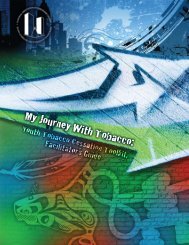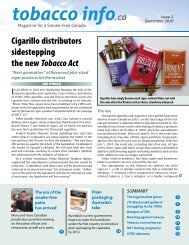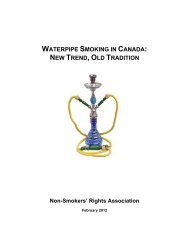Tobacco-Free Sports and Recreation Policies
Tobacco-Free Sports and Recreation Policies - New Brunswick Anti ...
Tobacco-Free Sports and Recreation Policies - New Brunswick Anti ...
Create successful ePaper yourself
Turn your PDF publications into a flip-book with our unique Google optimized e-Paper software.
<strong>Tobacco</strong>-<strong>Free</strong> <strong>Sports</strong> <strong>and</strong> <strong>Recreation</strong> <strong>Policies</strong><br />
Key informants, hockey team players <strong>and</strong> administrators had mixed views on whether the TFSR<br />
policy had prevented exposure to secondh<strong>and</strong> smoke (SHS). Two players discussed the SHS<br />
issue in this way:<br />
P1: I think it’s a success because if somebody did smoke like parents on the hockey<br />
team then I’m sure they’d be safe to let the players know that we’re not going to<br />
give it [SHS] to you.<br />
P2: we’re going to walk away. I think it’s good but we also, because lots of people<br />
who are like from away games <strong>and</strong> stuff they like know that it, they shouldn’t<br />
smoke like right by us <strong>and</strong> they probably have their, enough respect to like smoke<br />
somewhere else <strong>and</strong> nobody really smokes around us anymore. (Peewee Players)<br />
While the players felt that SHS exposure had been reduced since they began playing on these<br />
teams (the past three years), one PHU informant had a less optimistic perspective <strong>and</strong> reflected<br />
that, the biggest impact was definitely at the player level not necessarily at the spectator level.<br />
Respondents offered little insights into how the TFSR policy may have impacted tobacco litter, as<br />
a couple of key informants explained that different arenas may or may not have litter (cigarette)<br />
receptacles. In some cases, litter was less visible, <strong>and</strong> at other arenas, the cigarette butts were<br />
scattered beside the main doors, usually at the entrance.<br />
All respondents felt that a key objective of TFSR policy implementation is to promote positive role<br />
modeling for youth. Efforts were made by both teams to achieve this goal when the policy was<br />
adopted. For example, one player reported that the TFSR policy was circulated to hockey<br />
families, <strong>and</strong> another player felt that, when the policy was shared with their families, a strong<br />
role modeling effort was made by parents.<br />
Finally, in this case study, the TFSR policy has encouraged tobacco users to quit. Several<br />
respondents referred to a few parents who had chosen to quit smoking, in large part, as a result<br />
of the team’s adoption of the policy.<br />
Parents I think so because we had a set of parents that when we did start this[TFSR<br />
policy] they were smokers <strong>and</strong> then as the kids were made more <strong>and</strong> more aware<br />
of, like they kind of already knew but as you go into more detail they I think felt<br />
that it was time to quit <strong>and</strong> then having them have to sit, st<strong>and</strong> way out in the cold-<br />
[Laugh]-in their cars is, is <strong>and</strong> then the kids would be like stop smoking you know it<br />
was <strong>and</strong> they, they did stop so-at least two parents stopped <strong>and</strong> this could be<br />
linked to the policy. (Team Manager)<br />
Ontario <strong>Tobacco</strong> Research Unit 22





